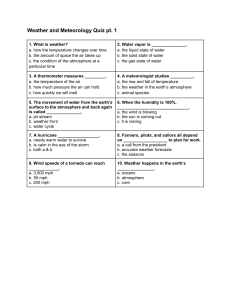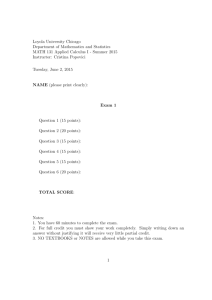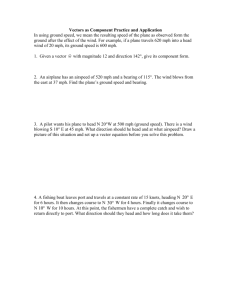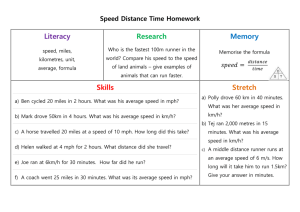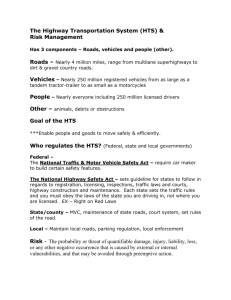CESSNA 172 SPEEDS - Beverly Flight Center
advertisement
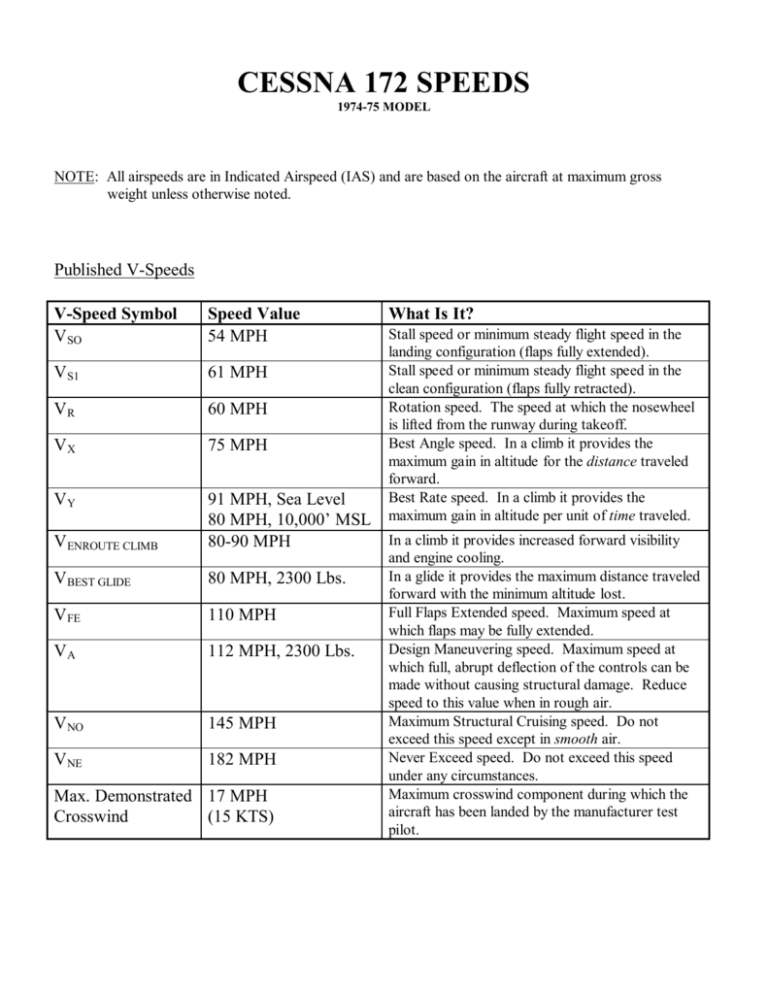
CESSNA 172 SPEEDS 1974-75 MODEL NOTE: All airspeeds are in Indicated Airspeed (IAS) and are based on the aircraft at maximum gross weight unless otherwise noted. Published V-Speeds V-Speed Symbol V SO Speed Value 54 MPH V S1 61 MPH VR 60 MPH VX 75 MPH VY 91 MPH, Sea Level 80 MPH, 10,000’ MSL In a climb it provides increased forward visibility 80-90 MPH V ENROUTE CLIMB V BEST GLIDE 80 MPH, 2300 Lbs. V FE 110 MPH VA 112 MPH, 2300 Lbs. V NO 145 MPH V NE 182 MPH Max. Demonstrated 17 MPH Crosswind (15 KTS) What Is It? Stall speed or minimum steady flight speed in the landing configuration (flaps fully extended). Stall speed or minimum steady flight speed in the clean configuration (flaps fully retracted). Rotation speed. The speed at which the nosewheel is lifted from the runway during takeoff. Best Angle speed. In a climb it provides the maximum gain in altitude for the distance traveled forward. Best Rate speed. In a climb it provides the maximum gain in altitude per unit of time traveled. and engine cooling. In a glide it provides the maximum distance traveled forward with the minimum altitude lost. Full Flaps Extended speed. Maximum speed at which flaps may be fully extended. Design Maneuvering speed. Maximum speed at which full, abrupt deflection of the controls can be made without causing structural damage. Reduce speed to this value when in rough air. Maximum Structural Cruising speed. Do not exceed this speed except in smooth air. Never Exceed speed. Do not exceed this speed under any circumstances. Maximum crosswind component during which the aircraft has been landed by the manufacturer test pilot. Airspeed Indicator Markings Range Full Flap Operating Arc Color Speed Values White 54-100 MPH Normal Operating Green 61-145 MPH Caution Yellow 145-182 MPH Never Exceed Red Line 182 MPH What Is It? Range of speed at which flaps may be fully extended. Range of speed at which the aircraft is normally operated. Range of speed at which the aircraft should be operated only in smooth air, and then only with caution. Never Exceed speed. Do not exceed this speed under any circumstances. Operational Speeds Operation Normal Takeoff (0° Flaps) Short-Field Takeoff, No Obstacle (10° Flaps) Short-Field Takeoff, Obstacle Clearance (10° Flaps) Soft-Field Takeoff, No Obstacle (10° Flaps) Soft-Field Takeoff, Obstacle Clearance (10° Flaps) Normal Landing (0° Flaps) Normal Landing (40° Flaps) Short-Field Landing (40° Flaps) Soft-Field Landing (40° Flaps) Speed Values 1.) V R 60 MPH 2.) V Y 91 MPH 1.) V R 60 MPH 2.) V Y 91 MPH 1.) V R 60 MPH 2.) V X 75 MPH 3.) V Y 91 MPH (when obstacle cleared) 1.) Lift off as soon as possible 2.) V Y 91 MPH 1.) Lift off as soon as possible 2.) V X 75 MPH 3.) V Y 91 MPH (when obstacle cleared) 1.) 70-80 MPH final approach 1.) 65-75 MPH final approach 1.) 70 MPH final approach speed 1.) 70 MPH final approach speed Average Cruise Speeds (based on 5000 feet Pressure Altitude, Standard OAT, No Wheel Fairings) 75% power, Best Economy Leaning 65% power, Best Economy Leaning 55% power, Best Economy Leaning 131 MPH True Airspeed (113 KTS TAS) 124 MPH True Airspeed (107 KTS TAS) 112 MPH True Airspeed (97 KTS TAS)

